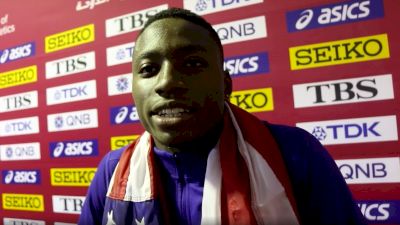Grant Holloway's Marathon Season Ends In Gold
Grant Holloway's Marathon Season Ends In Gold
After a year filled with all-time performances, Grant Holloway delivered on the biggest stage in Doha.

From his seat at Khalifa Stadium in Doha, Qatar, in between the second and third hurdles, Stan Holloway looked for a smile. His son, 21-year-old Grant Holloway, was in his first World Championship final in the 110m hurdles, sandwiched between the best hurdlers in the world.
At just 21 years old, and with a long list of and titles and records, the prospect of a gold medal felt both long overdue and remarkably sudden.
Stan focused on his son’s face.
“I saw the smile that I’ve always been looking for,” Stan said. “I knew then in my heart, OK, we’re going to have a good race.”
Wednesday marked the end of what has been a marathon season for the younger Holloway: American record indoors, collegiate record outdoors, two more NCAA titles, and some summer struggles. The final in Doha was his 42nd race of the year across six running events (he also long jumped eight times), in a season that began for him January 26.
The challenges were pronounced because Holloway’s struggles are rare and relative.
After he ran 12.98 to edge Daniel Roberts in the greatest NCAA hurdle race of all time, he went pro. He was runner-up in Des Moines behind Roberts, diving across the line in a tight race. It put him on his first world team, but the long season was draining the sensational from Holloway.
“The coaching side of me said, 'You’re trying too hard, you’re trying to emulate what you did at NCAAs.' Every race is different,” said Stan, who coaches high school track and field in Virginia where he was recently named USA Today’s coach of the year.
Holloway's parents saw his demeanor before races shift as well.
“He was all tense, looked mean,” Stan said. His most irrepressible trait, his confidence, Stan and his mother Latasha said, was missing.
At the Paris Diamond League one month ago, he faded down the stretch and placed sixth. He’d never finish that low in a hurdle race and not since he came to college had he suffered consecutive losses.
“I just sucked. I just ran like shit,” Grant said.
The inexorable post-NCAA letdown meant that the world still hadn’t had a proper introduction to Holloway, both the incredible physical talent and the personality that churns out tweetable quotes at a rapid pace.
Hollway’s difficulties -- few as they have been -- have been related to trying too hard, pushing too much. His coach, Mike Holloway, called him “an energy monster.”
He needs to be tamped down, not revved up.
“He wants to be perfect all the time,” Latasha said. “He just needs to realize that there are good days, there are bad days, and there are days like this that are great,” Latasha said.
Beginning with the semifinal, he looked the part on Wednesday. He danced behind his starting blocks before he won his heat in 13.10. It wasn’t the fastest of the qualifiers, but suddenly he was back to where he was in June.
The day before the final Grant, Stan, and Latasha had some family time. Just the three of them. They went for a walk in a Doha shopping mall.
“Be happy, be yourself. Be the Grant Holloway everybody know and love,” they told their son.
Grant flew out of the blocks in the final and grabbed the early lead. Jamaica’s Omar McLeod, two lanes to the inside of Holloway, began to make up the gap on hurdle eight.
“They had to come get him. Any time you are in the front and somebody has to come get you, you have a tendency to press,” Stan said.
McLeod’s pressing altered the race. He hit into hurdle nine, lost his balance and crashed into hurdle 10, running into Spain’s Orlando Ortega in the process (Ortega would later unsuccessfully protest the result).
Pascal Martinot-Lagarde, who was making a late run for a medal, didn’t see anything but heard “BAM, BAM, BAM,” as McLeod wiped out on the track in the final ten meters.
None of this impacted Holloway.
“I stayed in my lane, my space,” Holloway said. He crossed the line in 13.10, arms stretched wide, mouth agape. On the biggest stage of his career, his boundless energy couldn’t be contained. He ran around the entire bend, barely slowing down, in celebration. Sergey Shubenkov, impervious to all the commotion in lane nine, took silver in 13.15. France’s Pascal Martinot-Lagarde grabbed his first outdoor medal in third.
Grant had studied them both on Youtube because he’d studied every professional hurdler on YouTube. If you checked out his search history, he promised, that’s all you’d see.
“I’ve watched it all,” he said.
When the celebration was over, Holloway credited his “inner circle” with the win, praised his coach (“he never gave up on me, even when I was running like crap”), detailed his post-race plans (“I’m going to go find me a fat ass glass of wine”) and asked his parents if he could dump water on them while they were being interviewed (he did not).
It was the full Grant Holloway experience, a primer to a global audience of how captivating he can be.
As he sat down for the press conference, he fiddled with the microphone to get it to work. With some help from Martinot Lagarde, the red light came one, the mic was live.
“I’m new to this,” he said.